- Home
- Tim Lebbon
Dusk: a dark fantasy novel (A Noreela novel) Page 2
Dusk: a dark fantasy novel (A Noreela novel) Read online
Page 2
Time to leave, Kosar knew. He glanced at the bridge, queasy because he had not gone to help those children. But at least this way he still had the stomach to feel sick.
He turned and made his way along the trench on his hands and knees. Each splash in the shallow water was accompanied by a scream from the village, or a groan, or the thud of another useless arrow finding its mark. He'd seen some things in his time, some strange, some unpleasant, some weird and wonderful. But he had never seen a man fighting with thirty arrows letting his blood and twisting up his insides.
He stared to pant, and realised only then that he was panicking. The sounds from the village were receding as he lay distance down behind him. They were worse than before—the screams of children once more—but they were quieter now. Certainly not easier to hear, but less of a threat.
Kosar paused for a moment and lifted his hands from the muddy water. The ground was clay here, hardly ideal for planting crops but perfect for coating unwary crawlers with a blood-red deposit. He hung his head until his long hair dipped in as well, perhaps willing himself to be blooded. He had done nothing. Those children on the bridge, innocent, ignorant only because their parents were ignorant, so alive, so trusting…
He had done nothing.
“Oh Mage shit,” he whispered wretchedly.
The noise from the village stopped. No more screams. No more shouts. No more crossbows twanging, arrows whistling through the air or swords met in sparkling fury. Nothing but the slow, methodical footsteps of one man.
Kosar held his breath and raised his head slightly, looking back over his shoulder, the only sound now the thick water dripping from his hair. His hands were slowly sinking into the mud at the bottom of the ditch, his wounded fingertips stinging under the cold caress. It felt as if they were pressing into spilled guts and the image horrified him. He was a thief, not a murderer.
How would he know what spilled guts felt like?
And then he realised. As his eyes drew level with the dried grass and he saw the man in red strolling among the dead, he knew. He knew the feel of guts because he had seen them spilled, smelled their tangy scent, heard the screams of their owners as they tried to catch them. He knew because he had stood by and watched those children die, when he could at least have warned them that this man was danger, this man was death. And because a sick realisation suddenly dawned and he knew this man, who he was and where he was from. He'd heard whispers of legends, listened to outlandish stories by campfire light or the smoke-hazed atmospheres of taverns a lifetime from here.
The stranger was a Red Monk.
Which meant that somewhere in the land, magic was living again.
From the heights above Trengborne, Kosar watched the Red Monk wandering the silent village. From this distance the Monk resembled a huge spider, body bristling with arrow spines, his web a trail of blood in the dust. Sometimes he went inside the buildings, and occasionally there was a distant scream as he found someone hiding and silenced them at last. By the time his bloody route crossed and re-crossed itself, he was barely moving.
Kosar hid in the shadow of an overhanging rock on the valley slope, fascinated and terrified by what he was seeing. And seconds before he saw the Monk keel over and lie still at last, he caught sight of another shape beyond the village. It was on the facing hillside, so distant as to be little more than a speck moving on the grey rock face. Someone climbing quickly, fear urging them on. Another survivor.
Kosar wondered who it was. There were plenty down there he would never mourn, but there were also those that had shown him some measure of kindness. Looking at the sun bleeding down into the horizon, he knew that he had to find out. He would follow the survivor and perhaps they would share their stories.
Kosar was a branded thief who had lost the only place he had ever even thought of calling home. There was nothing better for him to do.
2
Rafe Baburn sat huddled on the hillside and stared down at the ruin of his life.
He was shivering, though it was still warm. Sweat beaded his skin, and the setting sun was still strong enough to bake his scalp, yet he shook and shuddered like a sheebok pulled from a mountain stream. He tried to cry out but his voice had gone, eaten away by shock. His memory too, slaughtered as surely as those children on the bridge, the militia outside the whorehouse. And his parents.
His father, probably still clasping the rusty old crossbow he'd not had the chance to fire.
His mother ...
But no, he would not think of that. He could not. He must think of something else, turn from the village and stare at a rock, wonder what it had seen in its long life, explore underneath to see if there were any secrets hidden—
She had run to his father where he lay bleeding on the stilted platform in front of their home. He was dead already, Rafe knew, but still his mother went to him, perhaps thinking that her love could mend all wounds. The sword whispered through the air and sang a song of violence as it buried itself in her chest. She fell with the sword still in her, and the killer, the murdering bastard, placed his red-booted foot on her breasts to lever the blade from bone and flesh.
Rafe had wanted to close his eyes. Hiding beneath the platform, dust showered down over his face. His father's blood had already pattered onto his forehead and dripped into his wide-open eye, and now his mother's blood was adding to it, urging him to drift away, forget what he had seen and never dream of it again. The blood was as warm as his parents’ hands on his forehead when he was having nightmares as a child. Or his father's fingertips, massaging Rafe’s tense scalp when he had so recently woken from strange dreams, unknown voices still muttering inside his head.
But he had not been able to look away. He was afraid that if he closed his eyes then the man in red—clicking and clacking as the arrows piercing his body knocked together—would find him. The murderer paused, standing with a foot either side of Rafe's dead mother, staring into the house. Rafe heard a sniff as he tested the air. He seemed undecided, unsure of whether or not to venture into the house or move on to the next. His decision was made for him when two screaming men charged onto the platform, attacking him with rusty swords.
The man had swatted them aside and opened them up as they fell to the ground. Several arrows whispered through the air and thudded into his chest and arms, and he left the platform to pursue the shooters.
Rafe had waited for a little while, terrified to move, listening to the sounds of death around him. It shifted across the village, tagged onto the red-robed man like his own shadow and, when Rafe judged it to be sufficiently distant, he ran.
He had tried not to look at his parents. He could smell them as he scrambled from beneath the wooden platform and he could hear the drip, drip of blood as it ran between the boards. He did not want to see them lying there dead. He wanted to remember them as they had been, not as they now were.
But of course, he had looked anyway. Unable to help himself, he saw what was left of the man and woman who had taken him in and brought him up from childhood, and who had died so obviously trying to protect him. And as his eyes alighted on the bloody ruins, flies already finding the wounds, another of the strange voices twisted into his head. He squeezed his eyes shut and fisted his hands, desperate to drive it back whence it had come. But he did not know where this was or why it was, so he was all but powerless against the ripple of weird words echoing through his consciousness.
Then a scream had cut through the sound and banished it for a while. Another cry followed, closer this time, so Rafe turned and ran. Guilt pricked at his neck like the gaze of the dead. His parents lay there unburied, open to the world, offering themselves to the scavengers and carrion that would come wandering in from the fields and hillsides soon enough. But there was also something urging him on: the sight of his parents’ deaths seen between rough boards; the sound of the man's sword as he twisted it from his mother's cleft ribs; the knowledge that, by returning and offering himself up for the same fate, he would be betraying
them in the worst possible way.
A dead thing is just that, his father had once told him. A dead thing is less than a rock in the fields. A rock has seen the past and will see the future; a dead thing will rot to nothing, go back to the earth and perhaps care for the next circle of planting and harvesting. It's what the dead thing was that matters, not what it is now.
His parents were no longer there. They had gone to wherever the ideas of living things go when they die. Into memory, perhaps, or an afterlife, or simply into the Black to add themselves to history.
So he sat on the open hillside and shivered and shook as he viewed the village lying dead in the valley. Ten minutes ago the man in red had dragged himself across the bloodied ground, leaving a smear in the dust behind him. He looked like a porcupine slowly winding down, or a cactus given brief life. His robe was pinned even tighter by the arrows, soaked a darker red by his copious blood. Then he had stilled. He had not moved since.
Rafe wanted so much to go back and make sure the killer was dead. That he had been alive when he killed Rafe’s parents was impossible, of course, with so many arrows venting his blood. But now that the man in red was silent and still, Rafe wanted to make sure. And, perhaps, he wanted to exact some sort of useless revenge. Take a sword to the corpse. Spread him across the village to accompany the death he himself had meted out.
The teenager—barely a man though he liked to think of himself as such, his parents' blood drying to a crust on his cheeks and forehead—did the hardest thing he had ever done. He turned his back on his village and started climbing. Through the mountain passes and into the next valley lay Pavisse. His uncle Vance lived there, he would help. He would know what to do. And he was all that Rafe had left.
Almost blind with grief, Rafe stumbled upward. He was sobbing and crying, hearing the dying shriek of his mother with every step.
High above, skull ravens rode the thermals and stared down.
It was way past midnight by the time Rafe crested the mountain pass and started to make his way down into the next valley. Pavisse sat like a glinting gem in the distance, spread across the valley floor and creeping up its slopes where mines sank wounds deep into the land of Noreela’s skin. Fires flickered in the night, streetlamps scored lines of light into the landscape, the bustling noise of the town reached him even this far up. He guessed it was still a few hours’ walk, but at least the lights would guide his way.
He had heard many stories about Pavisse but had never actually been there. They ranged from the gentle-but-firm advice of his mother to stay away (it's a hole, Rafe, a pit full of everything that isn’t good in the land), to excited babbling amongst his friends about how there were naked women in the streets, warriors in the bars, and an ancient wizard who had forgotten his own name living on the edge of town. But any past misgivings had been thrust aside by the deaths of his parents. Dangerous and unseemly Pavisse might be, but tonight it was safety, a light in the dark, a balm to Rafe's grief. Something to aim for now that murder had made him aimless.
Already he could smell the town. A giddying mix of stenches wafted up from the valley, helped on its way by a steady breeze coming down from the north. Some he recognised: the warm smell of just-cooked bread, rich and comforting; horse crap sweating in the heat; freshly turned earth, either from the fledge and coal mines that honeycombed the hills, or the fields on the flood plains. Stale beer too, reaching him even this far out. How much spilled ale, he wondered, to make such a stink? He’d heard the tales of bar fights and muggings in gloomy byways, but Rafe had faced a greater danger today and survived. Drunken miners did little to scare him.
But there were other smells he could not identify, however hard he tried. A rich, acidic sting, vaguely earthy, that may be something to do with the mines. A perfume that reminded him of rot. And an odour that was undoubtedly food, but no food he had ever tasted. Spice-rich, hot, even the smell promised a tortured stomach.
This high up in the mountains the land was completely untamed, and Rafe had to move cautiously to avoid stepping in a hole and breaking his ankle. Rocks hid among the sparse, low heathers, ready to trip him and send him stumbling. Melt trace as well, low ridges of loose stones left here after the last Age of Ice, virtually untouched since then except by the seasonal caresses of nature itself. Some of them were obvious, dark lines of shadow twisting along the hillside. Others were hidden by shrubs or long grasses, like snakes awaiting a catch. These were more dangerous.
The life-moon was out, lending a three-quarter light to his trek, affording him a silvery touch reserved only for the innocent and pure. But there were many definitions of pure, and Rafe suspected it was simply another legend left over from the time when magic was still alive. But the sheen of moonlight on his skin gave him a sense of calm, because being good and pure was something his parents had so often told him was important. Wish for whatever you will, his father had said, but yearning is different from having. To have impurely is worse than never having at all.
Well, he still lived in Trengborne, or he had until hours ago. A nothing village, a poor farmers’ settlement inhabited by simple folk out to make their living day to day, hour to hour. A place where his future promised little more than scratching a living in the dirt, celebrating when a new calf was born, getting drunk on the autumn windfalls, marrying a village girl and raising children to run through the same ageless scenario …
Except that things had changed.
Not only now, when a change was thrust cruelly and bloodily upon him. But before, days and weeks ago, a hint that something was occurring in his mind over which he held no real control. Something involving words he could not understand, themes and ideas which should be painting a picture for him but which, in reality, were merely keeping him awake. Yet they formed a concerto of change in his mind, unleashing his hobbled imagination. However terrible things now were, this journey seemed right. Meant to be. His parents were dead and there was a black pit of mourning opening up inside of him, but things were going the way that was intended. He was certain of it. From the day he had first heard those voices, he had known that he was destined for more than a life of farming.
There was a noise behind him.
Rafe crouched down low, spun on his heels and rested a hand on the hilt of his knife. He caught his breath, wished he could still his heart to hear better.
The noise again. A scattering of tiny pebbles and loose stones slipping down the incline as someone or something made their way down from above. He concentrated in the dark, sweeping his head left and right in the hope that he would pick out something from the corner of his eye. The life-moon revealed nothing. Whatever was up there knew he was looking and had hunkered down into another shadow.
But Rafe knew what it was. A demon, bleeding and moaning and coming for him on legs pierced by arrows and bolts. A man eager to complete the work he had so recently begun. The man in red, somehow still alive, colourless in the moonlight.
Rafe turned and slipped and went sliding down a patch of slick grass. He cried out, and there was another rattle of stones from above. He struggled to find his feet and slid down the hillside, digging his hands into the loamy ground and feeling his fingers slice through. He struck a rock. It opened a gash on his cheek and spilled warm blood across his face, but Rafe was glad. It made him feel alive. The pain invigorated him and drove him to his feet. Soon he was scampering down the hill, dodging rocks looming darkly from the night, hands held out to either side to afford him some balance and break his fall should he slip again.
He did not look back. To look back would be to invite the wrath of the thing pursuing him, give it an opportunity to hack and slice its way through his defence of pain and panic, cleave him in two from head to foot and let his insides cool here in the hills until the scavengers came. Instead he concentrated on the glittering spread of Pavisse, tinted silver by the life-moon. And before long he was running like a mountain goat, leaping from hump to hump, missing the gullies in between that would bend and snap hi
s leg, avoiding the rocks, their sharp edges promising to finish what the man in red had begun.
If there were noises of pursuit he did not hear them. There was no need to be silent now, and breath was punched from his lungs with every slap of his feet on the ground, every impact as he landed and sprang onward. Rafe’s mind seemed to retreat as he ran, revealing nothing of the passage of time, the shifting of night, nor the exhaustion he was forcing himself into. His body protected itself by driving him out of his mind.
By the time he reached the stone walls–the first touches of humanity since leaving his dead village–dawn had broken and spilled its glow along the valley. Rafe paused, hardly able to breathe, his heart hammering, his legs ready to fold beneath him. For the first time in hours he looked back, became aware once again. Shadows still hid beneath rocky overhangs higher up on the hillsides. He wondered what hid within them.
On the way into Pavisse he passed by an old mine. Its throat was open to the air like a badly healed wound, the land around it scarred blank by dust, horses’ hooves, and the feet of the workmen who had lived and died hauling coal and fledge from the ground. To one side of the opening, overgrown and decayed down over the centuries since it had died, stood a machine. Its grey flanks of stone were supported by rusted veins of worked metal, and there were empty spaces where pieces of it had once been.
A machine! Rafe had only ever seen small ones, as big as his head or torso, their forgotten purposes only guessed at. But this one was huge, almost as large as the house he and his parents had lived in. Birds nested in its upper portions, and a soft breeze whistled through its long-putrefied guts. Rafe wondered what its function had been, but the very idea of this massive, mysterious thing moving shocked and astounded him. His parents had told him that these things had not worked since the War, but before that they had been here forever.

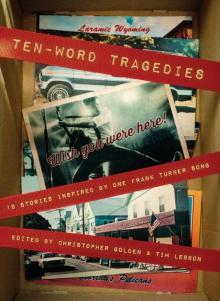 Ten-Word Tragedies
Ten-Word Tragedies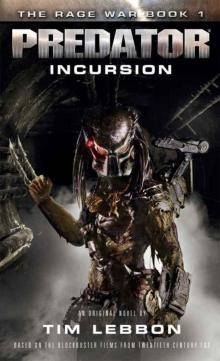 Predator: Incursion
Predator: Incursion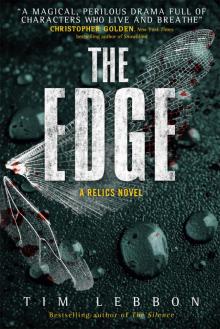 Relics--The Edge
Relics--The Edge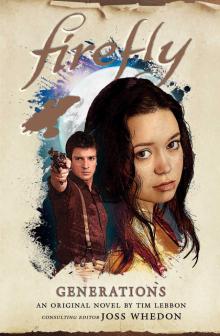 Firefly
Firefly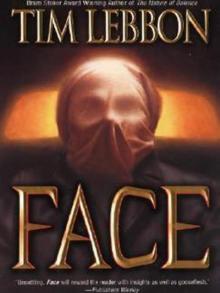 Face
Face Generations
Generations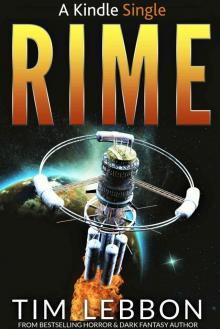 RIME (Kindle Single)
RIME (Kindle Single) Fallen
Fallen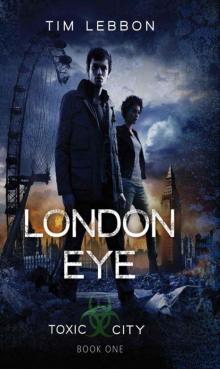 London Eye tc-1
London Eye tc-1 Kong: Skull Island
Kong: Skull Island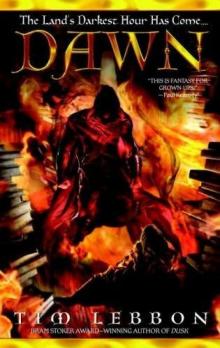 Dawn n-2
Dawn n-2 Into the Void: Star Wars (Dawn of the Jedi)
Into the Void: Star Wars (Dawn of the Jedi)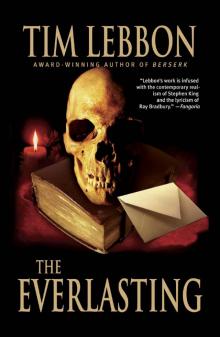 The Everlasting
The Everlasting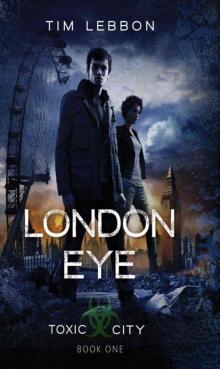 London Eye: 1 (Toxic City)
London Eye: 1 (Toxic City)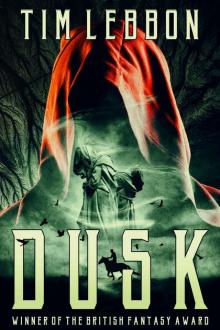 Dusk: a dark fantasy novel (A Noreela novel)
Dusk: a dark fantasy novel (A Noreela novel)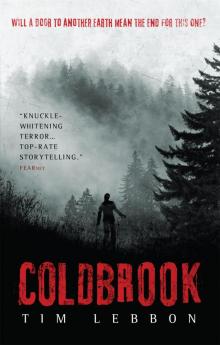 Coldbrook
Coldbrook Alien
Alien Dusk
Dusk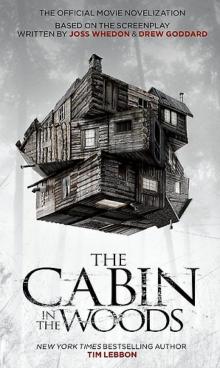 The Cabin in the Woods
The Cabin in the Woods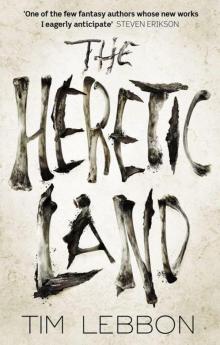 The Heretic Land
The Heretic Land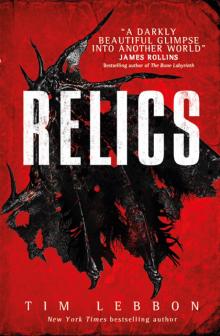 Relics
Relics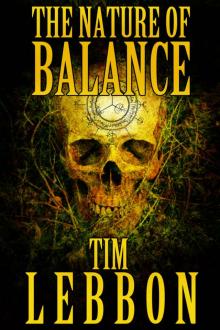 The Nature of Balance
The Nature of Balance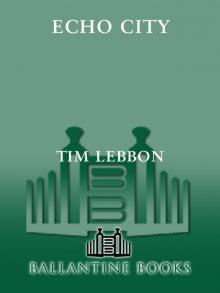 Echo City
Echo City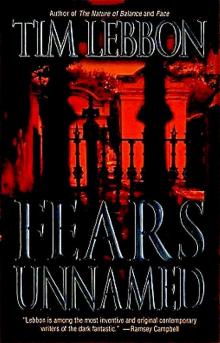 Tim Lebbon - Fears Unnamed
Tim Lebbon - Fears Unnamed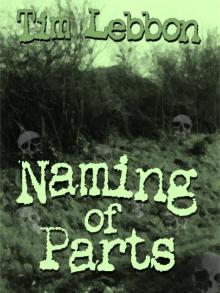 Naming of Parts
Naming of Parts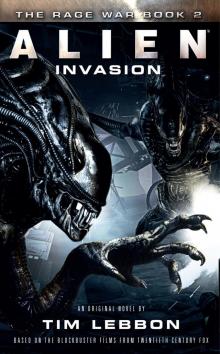 Alien--Invasion
Alien--Invasion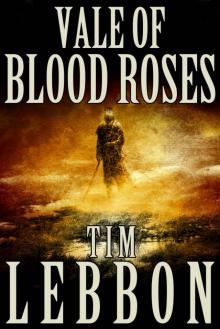 Vale of Blood Roses
Vale of Blood Roses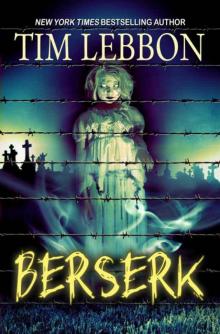 Berserk
Berserk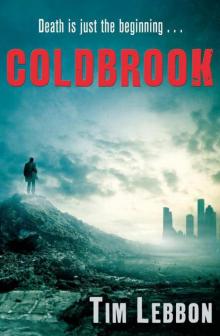 Coldbrook (Hammer)
Coldbrook (Hammer)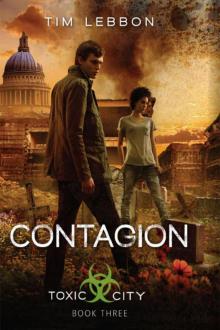 Contagion tc-3
Contagion tc-3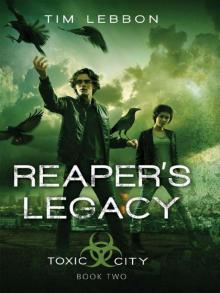 Reaper's Legacy: Book Two (Toxic City)
Reaper's Legacy: Book Two (Toxic City)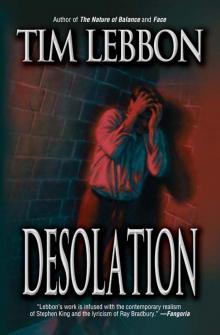 Desolation
Desolation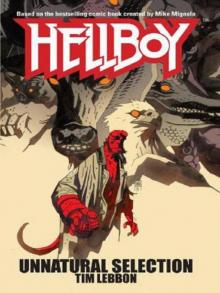 Unnatural Selection
Unnatural Selection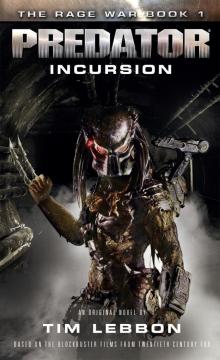 Predator - Incursion
Predator - Incursion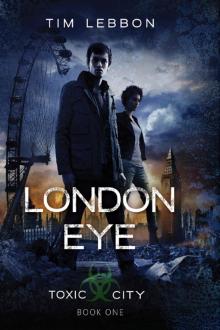 London Eye
London Eye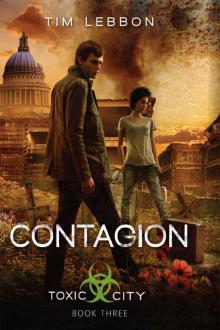 Contagion (Toxic City Book Three)
Contagion (Toxic City Book Three) The Silence
The Silence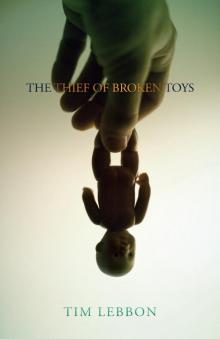 The Thief of Broken Toys
The Thief of Broken Toys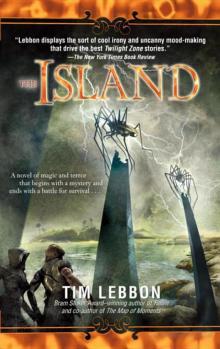 Tales of Noreela 04: The Island
Tales of Noreela 04: The Island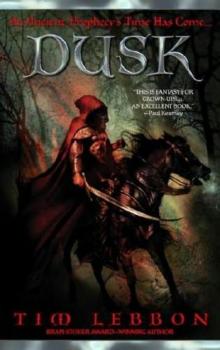 Dusk n-1
Dusk n-1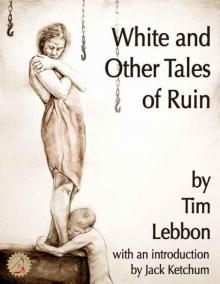 White and Other Tales of Ruin
White and Other Tales of Ruin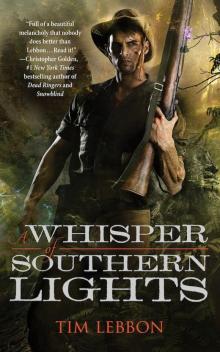 A Whisper of Southern Lights
A Whisper of Southern Lights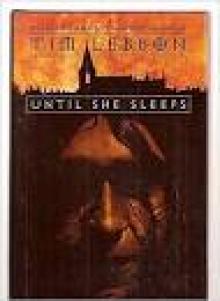 Until She Sleeps
Until She Sleeps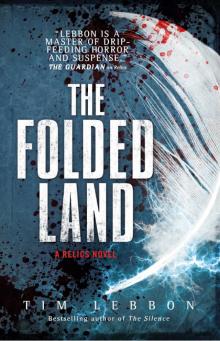 Relics--The Folded Land
Relics--The Folded Land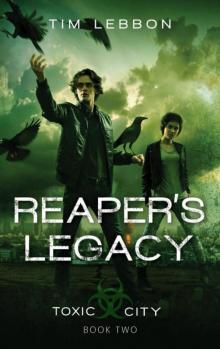 Reaper's Legacy tc-2
Reaper's Legacy tc-2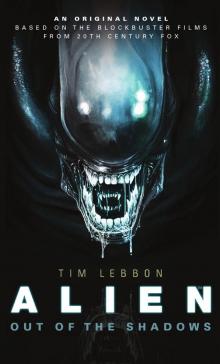 Alien: Out of the Shadows
Alien: Out of the Shadows Pieces of Hate
Pieces of Hate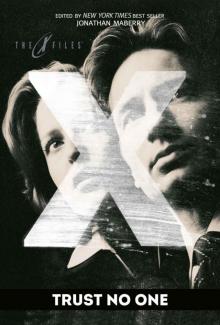 X-Files: Trust No One
X-Files: Trust No One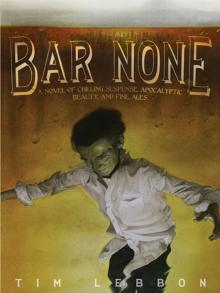 Bar None
Bar None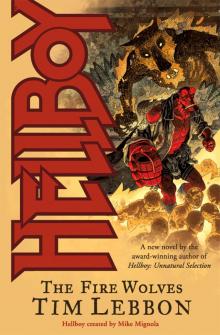 The Fire Wolves
The Fire Wolves